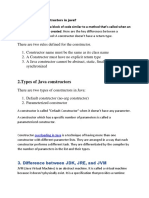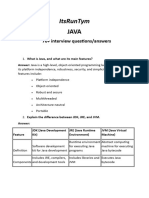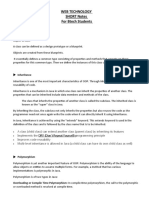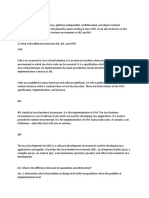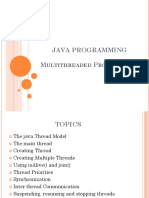0 ratings0% found this document useful (0 votes)
3 viewsJava Thread
Uploaded by
akbala08Copyright
© © All Rights Reserved
Available Formats
Download as DOCX, PDF, TXT or read online on Scribd
0 ratings0% found this document useful (0 votes)
3 viewsJava Thread
Uploaded by
akbala08Copyright
© © All Rights Reserved
Available Formats
Download as DOCX, PDF, TXT or read online on Scribd
You are on page 1/ 1
JAVA Thread
1. How does Java handle multithreading, and what are the ways to
create threads in Java?
Java supports multithreading by allowing multiple threads to execute concurrently
within a single Java application. To create threads, you can use either of the following
methods:
1) Extending the Thread class and overriding the run() method.
2) Implementing the Runnable interface and providing the implementation for
the run() method.
3) Implementing the Callable interface with the call() method (Java's newer
approach, returning a result).
2. How do you handle concurrency issues in Java?
Concurrency issues in Java can be handled using various techniques such as:
Synchronization: Using synchronized keyword to make methods or code blocks
thread-safe.
Locks: Using explicit locks from the java.util.concurrent.locks package, like
ReentrantLock.
Atomic classes: Using atomic classes from the java.util.concurrent.atomic
package to perform atomic operations on primitive data types.
Thread-safe data structures: Using thread-safe collections from the
java.util.concurrent package, like ConcurrentHashMap.
3. Explain the static keyword in Java.
The static keyword is used to define class-level members that belong to the class and
not to individual instances of the class. Here are some key points:
static variables (or class variables) are shared among all instances of the
class.
static methods can be called using the class name and do not require an
instance of the class to be invoked.
static blocks are used to initialize static variables or perform one-time
initialization tasks for the class.
You might also like
- 2 Mark Questions and Answer: IT2301-Java ProgrammingNo ratings yet2 Mark Questions and Answer: IT2301-Java Programming10 pages
- What Is The Difference Between Private, Protected, and Public?No ratings yetWhat Is The Difference Between Private, Protected, and Public?26 pages
- Java_InterviewQuestion_LinkedIn_JavaCommunityNo ratings yetJava_InterviewQuestion_LinkedIn_JavaCommunity45 pages
- 2 Mark Questions and Answer: IT2301-Java ProgrammingNo ratings yet2 Mark Questions and Answer: IT2301-Java Programming11 pages
- 22CS202 JAVA PROGG ANSKEY FIAT SIAT ME ESE 2022-2023No ratings yet22CS202 JAVA PROGG ANSKEY FIAT SIAT ME ESE 2022-202333 pages
- Interview Q Answer Core Java From Youtube Video (AutoRecovered)No ratings yetInterview Q Answer Core Java From Youtube Video (AutoRecovered)14 pages
- Scheme - Updated - CIE 1-QP BCS306A SET2No ratings yetScheme - Updated - CIE 1-QP BCS306A SET222 pages
- Q2. Explain Public Static Void Main (String Args ) in JavaNo ratings yetQ2. Explain Public Static Void Main (String Args ) in Java9 pages
- Top 50 Core Java Interview Question AnswersNo ratings yetTop 50 Core Java Interview Question Answers32 pages
- Fundamental of Java Programming Oral Question BankNo ratings yetFundamental of Java Programming Oral Question Bank12 pages
- IGNOU PGDCA MCS 206 Object Oriented Programming using Java Previous Years solved PapersFrom EverandIGNOU PGDCA MCS 206 Object Oriented Programming using Java Previous Years solved PapersNo ratings yet






